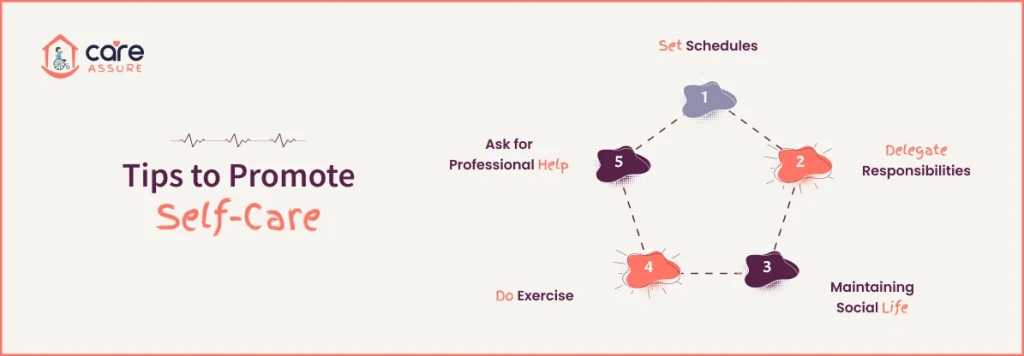How to Access Immediate Support Through Emergency Respite Care
September 9, 2024
|By Careassure
|10 min read

If you are caring for a loved one with health issues, dementia or disabilities, you probably need time off to manage your own health and personal business or just to have time for yourself. Healthcare professionals term it ‘respite care’. But the possible chances are you’re not getting the respite care you desire. As per the Australian Institute of Health and Welfare report June 2022, nearly 213,000 home care people were aged 65 and over. It is more than triple the 69,500 people aged 65 and over receiving home care services in June 2017. Almost 4 in 10 family caregivers want respite services, but only 14% receive them. That gap comes with a price. Caregiving has consequences. Caregiver surveys show that the levels of emotional distress that caregivers experience are very high. Many caregivers say their health has been affected, and more than a third say their finances have also been impacted. Respite care may not be a silver bullet. In this blog post, we'll define emergency respite care, its importance, accessibility and share useful tips to promote self-care.
What is Emergency Respite Care?
Respite care involves providing temporary assistance to an elderly person, child, or any patient, so that their regular caregiver can have a break. This service is required because caring for a person involves high physical and mental demands. It is therefore advisable that those in charge of this work have the assistance of secondary staff to replace them for short periods of time. It is worth mentioning that this service is provided in different contexts, such as the home, a care centre or a hospital.
Why is Emergency Respite Care Important?
Caring for any type of person takes time. It also requires physical and mental strength of the person in charge. Consequently, if breaks are not taken, adverse effects worsen with every passing day. In addition to threatening the health of the caregiver, the well-being of the elderly, child, or patient is put at risk. For this reason, it is essential to include relief staff. Some factors that help identify when it is time to have assistance are the following:
- Constant tiredness.
![icon]()
- Irritability and impatience.
![icon]()
- Anxiety with insomnia.
![icon]()
- Loss of interest in activities that served as a source of recreation.
![icon]()
- Depression, constant worry and sadness.
![icon]()
How to Access Emergency Respite Care
1. Design a Plan
The first step in emergency scenarios is to design a family plan that fits not only the needs of the patient but also what the caregiver may require. Once that is done, you must consider who is available to help. In summary, the following questions must be answered:What does the primary caregiver need? Rest times, days off, and entry and exit times must be studied.
What does the patient, elderly person or child require? Care, meals, house cleaning, laundry, grooming, assistance with medical tasks. A good recommendation is to list needs from most significant to least.
Who can replace the primary caregiver? Create a list of people who can replace the primary caregiver when they need a break. This can include other family members, private respite services, and institutions.
2. Organise a Family Meeting
Once you have a clear picture of each person's needs, it is time to organise a meeting with all the core members. The requirements of the caregiver, the patient, and the auxiliary staff should be explained. Some elements that are helpful for a successful family reunion are the following:Be specific: all the points to be discussed must be clear.
Flexibility: the ideal is to offer different options and thus choose the one that suits everyone.
Answer questions: Many questions may arise during the meeting. Therefore, we recommend asking different family members about their concerns and finding solutions.
Establish a schedule: Organisation is the best way to carry out any procedure. In these cases, a calendar that indicates which day the relief caregiver will be assigned and the rest times can be helpful.
3. Selecting External Relief Services
As we have already explained, respite care is a very responsible activity. It is best to have trained personnel when dealing with patients with delicate health conditions.Hiring services from local or national organisations, whether paid or non-profit, is essential. We suggest checking local associations if you need help figuring out where to start your search. They can also tell you about free or reduced-cost respite programs. In addition, government plans or other institutions often provide financial assistance for those in need.
4. Deciding to Take Care of Everyone
If you are a family member of a person who requires constant care, you must decide to facilitate the relief. Organise a meeting with those involved and evaluate the available possibilities. The plan should focus on everyone's health: the patient being cared for, whether a child or an elderly person, the person providing the service, and their family members. Work as a team to achieve a successful outcome.Tips to Promote Self-Care
It is no secret that dealing with very high levels of stress and not getting adequate rest can be detrimental to your health. That is why we have detailed a series of recommendations to promote self-care.

Set Schedules
If you are a caregiver, it is important that you have time to do other things and that you can find a suitable space to carry out activities that help you get out of the routine. Therefore, it is best to establish a schedule in which you have at least one free hour.Delegate Responsibilities
This is vital. Caring for a dependent person should not be the exclusive responsibility of one individual, so it is necessary to establish agreements with other family members and, in turn, with social services. This does not mean that one should neglect the dependent person. On the contrary, having more help will make the time of care optimal.Maintaining Social Life
Remember to take some time for yourself when you set your schedule and make time for your friends. This will bring you happiness and help you clear your mind. In addition, the bonds you create with other people are very important for your well-being and it is very useful to take care of your emotions.Do Exercise
It doesn't matter if you want to join the gym, go for a run in nature, or do yoga. The important thing is that you do some kind of physical activity every day. You can even do exercises at home, although we recommend that you go outside. This will allow you to change your environment and help you feel much better.Ask for Professional Help
If you feel overwhelmed, don't hesitate to seek professional help. A psychologist will help you manage your emotions better and give you some tools to feel better. Making time for these visits is also part of your well-being.Putting these tips into practice will undoubtedly help you create spaces to take care of your health and perform this wonderful task much better. Your well-being is also a priority. This way, you will be able to give your best every day.
How NDIS and NDIA Work In Conjunction?
NDIA and NDIS are two separate organisations. They work closely together to improve the lives of disabled people. NDIA, the administrative branch, oversees NDIS activities and the program's control and monitoring. NDIS, the programmatic branch, focuses on support services. Together, both organisations can build an extensive ecosystem of support to cater to the unique needs of disabled people. People with disabilities must understand the roles and functions of NDIA and NDIS to help navigate their support life. Explicit knowledge of each entity ensures a smoother experience accessing and managing support services.
Conclusion
For caregivers, emergency respite care is an essential resource. In times of crisis, you can ensure that you and your loved ones get the help you want by being aware of your options and making a plan. It can be beneficial to access immediate respite care, whether via organisations or one's own efforts. Setting a priority for the kind of care will help you avoid burnout and guarantee your loved one gets the high-quality care they need.
For personalised service and to discover emergency respite care resources in your area, please contact us now or visit our website for more details. Don’t wait until an emergency strikes!
Frequently Asked Questions (FAQs)
A temporary caregiving service is provided when a regular caregiver cannot continue due to a medical emergency or sudden personal circumstances.





